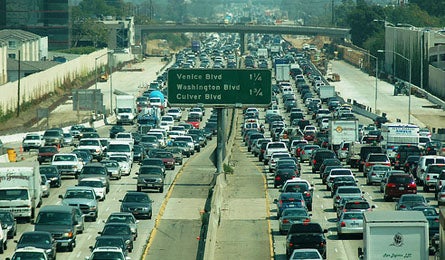How California Rolls: Auto Greenhouse Gas Emissions Capped

Hot on the heels of Wednesday’s Earth Day hoopla, California passed a law Thursday that limits greenhouse gas emissions released by fuel-powered vehicles.
The regulation, which was passed 9 to 1 by the Air Resources Board, is the first of its kind. Carbon emissions and greenhouse gases from motor fuels have long since been a major cause of global warming and Gov. Arnold Schwarzenegger hopes that his new, lower-carbon fuel plans will “reduce global warming,” and “encourage the investment we need to transform our energy infrastructure,” according to the Los Angeles Times.
With this new complex rule, California is anticipated to cut its gasoline consumption by a quarter in the next decade, open the roads and market up to more alternate-fuel-powered vehicles, and foster a growth in newer, more innovative means of getting fuel, the article said.A $100-million plant that converts trash into fuel is already planned for a north L.A. county valley.
Starting in 2011, when the new regulation takes effect, all those who make, refine and import gasoline– including diesel– will be forced to lower their fuel’s carbon footprint by 2020. The state hopes that by doing so, a greater movement towards tackling Earth-heating gas emissions and bringing a greater general awareness to the effect that these gases have on our climate.
California Air Resource board chairman, Mary D. Nichols, in a statement to the New York Times, praised the newly-passed regulation by mentioning some of its major benefits.
“The drive to force the market toward greater use of alternative fuels will be a boon to the state’s economy and public health — it reduces air pollution, creates new jobs and continues California’s leadership in the fight against global warming.”
The passing of this measure has sparked talk from 16 other states, which are considering implementing similar restrictions. President Obama has talked of a nation-wide regulation but no immediate move for such action seems on the horizon.
Not everyone is happy with the rule though—and a flurry of criticism is coming from both sides of the environmental fence. Activists and fuel investors alike criticized the new rule at a hearing that was held in California back in March and another one right before the vote. A main concern is that the regulation could hit the major alternate fuel, corn ethanol, and its industry and investors hard, having an adverse affect on the state of the fuel, which has been thought to be a cleaner gasoline alternative. In 2008 alone, corn prices reached an all-time high as biofuel demand grew.
Corn ethanol producers feel that the regulation is based on bad science and an exaggeration of the effect plant-based fuel has on our climate.
“The corn trade is understandably nervous and watchful,” Rich Feltes,
senior vice president of MF Global Research, a company that analyzes agricultural and energy markets, told Reuters.
“We all know the extent to which ethanol has been a factor in the last three years in pumping up risk premium in corn. Anything that would unwind that is going to be viewed as negative.”
Ethanol producers are seeing some hard times. According to Reuters, over the last year, corn prices have fluctuated and gasoline prices have fallen.
Environmentalists have claimed that there has been much land and forest displacement with the increase of corn growth.
Despite the strife stemming from the regulation, the standard’s passed is significant in terms of the precedent it sets for the environmental policy going forward.
Regardless of which way you stand on the issue, one should take a look at the larger, greener issues at hand, said Roland Hwang, the transportation program director at the Natural Resources Defense Council.
“Instead of fighting the implementation of the standard,” Hwang said, “We encourage the existing ethanol industry to face this challenge with the same spirit of innovation that makes California the center of clean-tech investment.”
What do you think? Is California’s move a good one? Tell us in the comments section below.
–California to limit greenhouse gas emissions of vehicle fuels– The Los Angeles Times, Margot Roosevelt, 4-24-09
–Ethanol investors try to derail California’s carbon-emissions proposal– The Los Angeles Times, Margot Roosevelt, 3-27-09
–U.S. corn girding up Calif low-carbon fuel standard– Reuters UK, 4-23-09
–California fuel move angers ethanol makers, The New York Times, Kate Galbraith, 4-24-09
Photo Credit to Atwater Village Newbie on Flickr
–Matt Draper